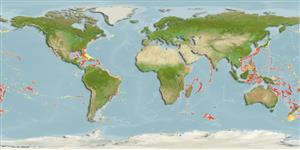Common names from other countries
Environment: milieu / climate zone / depth range / distribution range
Ecologia
marinhas bentopelágico; intervalo de profundidade 260 - 775 m (Ref. 57911). Deep-water
Widespread in tropical Atlantic and Indo-West Pacific Oceans.
Tamanho / Peso / Idade
Maturity: Lm ? range ? - ? cm
Max length : 37.1 cm TL macho/indeterminado; (Ref. 13608)
Vértebras: 133 - 141. This species is distinguished by the following characters: with pectoral fin; dorsal-fin origin over tip of pectoral fin, predorsal length 14.0-17.1% TL; anus posterior, more than 1 head length behind pectoral fin, preanal length 26.8-28.8% TL; trunk long, trunk length 12.8-16.4% TL; intermaxillary teeth absent; vomer with 4 compound teeth; upper and lower jaws with multiple rows of teeth; head pores: IO 4, SO 3, M 6, POP 0, AD 1, ST 0, F 0; lateral-line pores absent; MVF 11-28-136, total vertebrae 133-141; colour of body light brownish dorsally, paler ventrally; dorsal and anal fins with white margin, posterior one third of anal-fin base and posterior one-seventh of anal fin black (Ref. 106136).
On the continental slope (Ref. 57911).
Ciclo de vida ou comportamento de acasalamento
Maturities | Reprodução | Spawnings | Egg(s) | Fecundities | Larvas
Uyeno, T., K. Matsuura and E. Fujii (eds.), 1983. Fishes trawled off Suriname and French Guiana. Japan Marine Fishery Resource Research Center, Tokyo, Japan. 519 p. (Ref. 13608)
Status na Lista Vermelha da UICN (Ref. 130435)
CITES (Ref. 128078)
Not Evaluated
Ameaça para os humanos
Harmless
Uso pelos humanos
Ferramentas
Relatórios especiais
Baixar XML
Fontes da internet
Estimates based on models
Preferred temperature (Ref.
115969): 6.8 - 15.4, mean 10.1 (based on 336 cells).
Índice de diversidade filogenética (Ref.
82804): PD
50 = 0.7500 [Uniqueness, from 0.5 = low to 2.0 = high].
Bayesian length-weight: a=0.00102 (0.00046 - 0.00225), b=3.06 (2.88 - 3.24), in cm Total Length, based on all LWR estimates for this body shape (Ref.
93245).
Nível Trófico (Ref.
69278): 3.8 ±0.3 se; based on size and trophs of closest relatives
Resiliência (Ref.
120179): Baixo, tempo mínimo de duplicação da população 4,5 - 14 anos (Assuming tmax>10).
Fishing Vulnerability (Ref.
59153): Low to moderate vulnerability (27 of 100).
